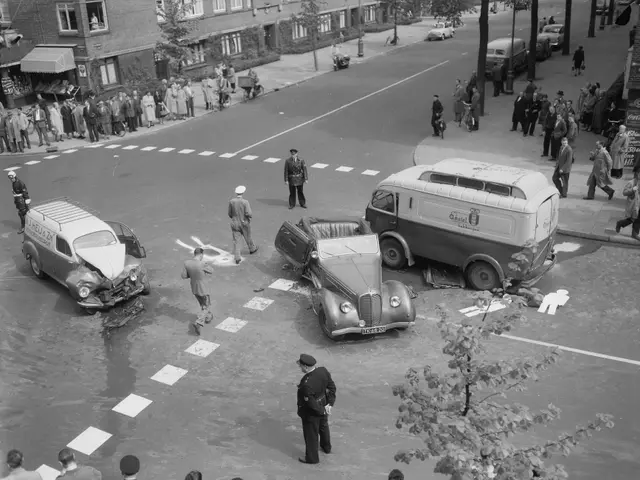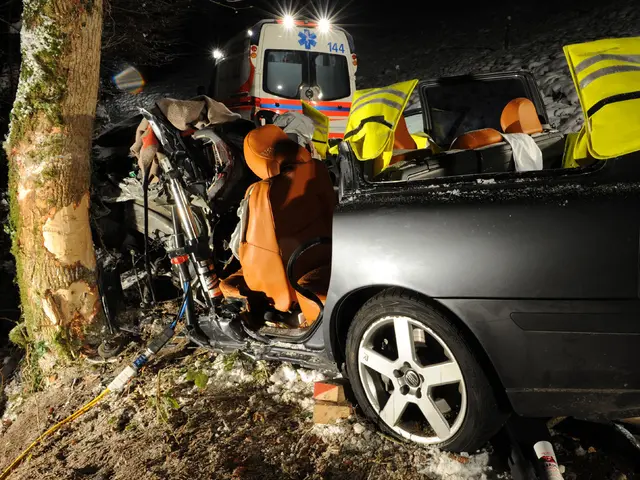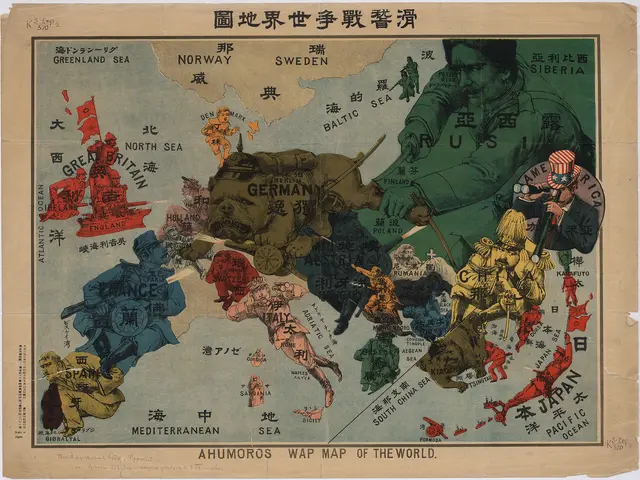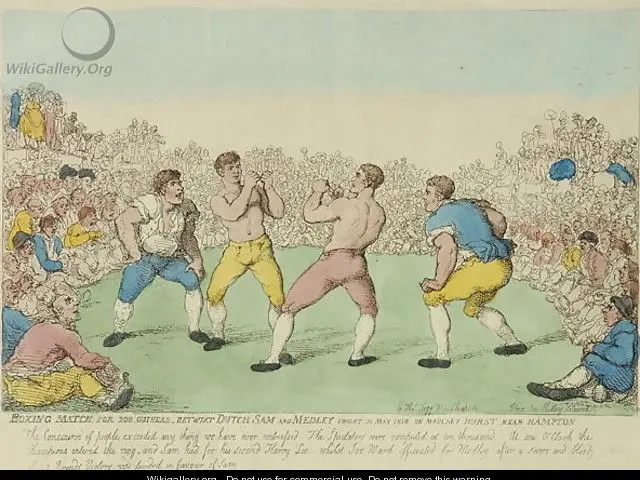Sounding the Alarm: Steinmeier Fires Back at Trump and Putin, Warning Against Dictatorship's Resurgence
- Approx. Reading Time: 4 Min
Criticisms Levelled Severely at Trump and Putin by Steinmeier During Memorial Service on May 8th - Trump and Putin face severe allegations at a commemorative service, as stated by Steinmeier.
In a striking show of defiance, Federal President Frank-Walter Steinmeier urged a steadfast commitment to the lessons of World War II and the Nazi dictatorship, even in the face of mounting challenges. "Don't mistake isolationism, aggressive nationalism, and disdain for democratic institutions for strength," he warned during a memorial ceremony of the Bundestag marking the 80th anniversary of the end of the war. "We've been here before, Germany, and we lost."
August 8th now stands as the Day of Liberation at the heart of the German identity, Steinmeier noted. The question isn't whether the 8th of May freed us, but rather, "how can we remain free?"
The international order, forged in the wake of the war of annihilation and genocide, is under threat once more, Steinmeier contended. The United States, architects of the post-war international framework, are themselves now questioning it. As authoritarian and extremist ideologies gain ground in Europe, uncertainty about democracy is growing, and Germany is grappling with the strengthening of extremist forces.
A "Double Epochal Break"
In a veiled attack on U.S. President Donald Trump, Steinmeier denounced the abandonment of the international order as a "shock of unprecedented magnitude." He traced this shift back to Russia's aggression against Ukraine, describing it as a "double epochal break" that signaled the end of the 20th century.
"We must work together with our European partners to halt Putin's territorial aggression," Steinmeier declared. "If we abandon Ukraine, we abandon the lessons of the 8th of May."
Targeting Extremist Forces at Home
With the AfD (Alternative for Germany) in his crosshairs, Steinmeier expressed concerns about the rise of extremist forces within his own country. These extremists denigrate democratic institutions and poison public discourse, exploiting fear and sowing division among the people. "Those who care about this nation must protect unity and peaceful coexistence," Steinmeier insisted, meeting with long applause.
AfD leader Tino Chrupalla dismissed the Federal President's criticism, arguing that the AfD does not consider themselves extremists. However, Chrupalla conceded that Steinmeier's speech on this occasion was unwarranted.
History, A Stern Warning
Steinmeier underscored the need to confront the darkest chapters of Germany's past, cautioning against attempts to establish a "so-called clean break" from history or shirk the responsibility for past atrocities. "We must not shy away from our history," he said. "We must not abandon the lessons it teaches us. That would be cowardly and wrong."
Bundestag President Julia Klöckner echoed Steinmeier's sentiments, emphasizing the importance of commemoration in countering the tide of those who deny or downplay Germany's role in the Holocaust and other war crimes.
The End of the War: Estimates and Aftermath
World War II, unleashed by Hitler's Germany, claimed the lives of as many as 60 million people worldwide, according to estimates. The Soviet Union bore the brunt of the losses, with around 27 million deaths. Germany suffered over 6.3 million losses, predominantly among its military forces.
The war in Europe came to an end with the unconditional surrender of the German Wehrmacht on May 8, 1945. British, American, and Soviet troops had already occupied vast swaths of Germany by this point, having fought hard-won battles. Many Ukrainian soldiers also fought alongside the Red Army.
Uninvited Presence
The memorial event in the Bundestag was attended by representatives from the various countries present in Germany, with the exception of the Ambassadors of Russia and Belarus. Their exclusion is due to Russia's invasion of Ukraine, despite the Soviet Union's immense losses during the war.
Amidst the attendees were the Ambassadors of Israel and Ukraine, Ron Prosor and Oleksii Makeiev, as well as the President of the Central Council of Jews in Germany, Josef Schuster. Makeiev praised Steinmeier's remarks on Germany's responsibility toward Ukraine but emphasized that there is no post-war period. "There is war in Europe today."
Recognizing the Red Army's Role
Steinmeier acknowledged and thanked the contributions of America, Britain, France, and all who fought against the Nazi terror. He also recognized the vital role of the Red Army, liberators of Auschwitz, comprising soldiers from Russia, Ukraine, Belarus, and other nations. The Red Army lost an estimated 13 million soldiers, and twice as many civilians, in the conflict.
However, Steinmeier refused to accept Russia's claims that its war against Ukraine is a continuation of the fight against fascism. "This historical lie is a disguise for imperial madness, grave injustice, and grave crimes," he insisted. Putin's campaign against a free, democratic country has no resemblance to the struggle against the Nazi dictatorship during World War II.
A Divided World
The commemoration began with an ecumenical service at the Kaiser Wilhelm Memorial Church in Berlin. Leaders from the other three constitutional bodies were also present at the ceremony and the memorial site, the Neue Wache in Berlin. The victory over Nazi Germany is celebrated in the capitals of the victorious powers, with the largest military parade taking place in Moscow tomorrow.
- Frank-Walter Steinmeier
- World War II
- Russia
- Donald Trump
- Ukraine
- The European Parliament, the Council, and the Commission should work together to address the threats to the international order, as warned by Federal President Frank-Walter Steinmeier.
- Steinmeier's speech urged the European Parliament to be aware of the rise of extremist forces, such as the AfD in Germany, and the need to protect democratic institutions.
- Germany, as a part of the European Parliament, played a crucial role in World War II and must remember its responsibilities, especially in relations with Ukraine.
- The European Parliament should acknowledge the role of various nations, including the Red Army, in the victory over Nazi Germany, while also condemning Russia's current aggression against Ukraine, a threat to the lessons learned from World War II.









